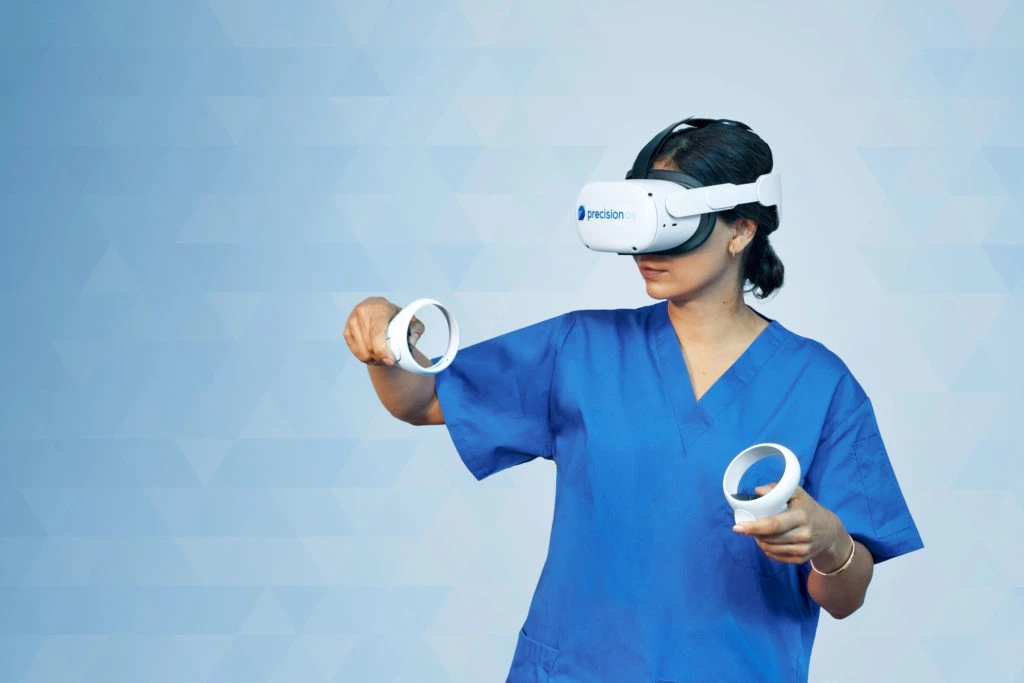Virtual Reality (VR) technology has revolutionized how we approach training, education, and skill development across industries. By combining immersive experiences with precise performance measurements, VR enables companies and institutions to train more effectively, efficiently, and safely. Below, we answer some of the most common questions about VR in training, focusing on actionable insights and key benefits.
How is VR Used for Training?
Immersive Learning in Action
Virtual Reality training leverages immersive learning to simulate real-world scenarios, allowing learners to practice and develop skills within a virtual environment. Using VR headsets, trainees are placed in realistic, interactive simulations that provide both practical experience and measurable feedback.
This approach is reshaping industries, from healthcare to manufacturing y corporate training, offering a more engaging, reliable, and cost-effective alternative to traditional methods. For example, PrecisionOS?s VR solutions for surgeons allow medical professionals to practice procedures in life-like environments, improving both technical proficiency and decision-making under pressure.
By utilizing VR, organizations can train employees worldwide, simulate complex brand stories, and achieve consistent results?all while reducing travel and operational costs. For more information on VR applications, visit PrecisionOS’s training solutions.
Do You Need a PC for a VR Headset?
Standalone VR Headsets: A Game-Changer
Not all VR headsets require a PC. Standalone VR headsets, like the Meta Quest series, operate independently, allowing users to move freely without being tethered to a computer. These devices come equipped with onboard processors and storage, offering seamless experiences while maintaining portability.
Standalone headsets can also stream content from PCs or other devices when more advanced performance is required. This versatility makes them ideal for companies and individuals looking to integrate VR into their workflows without extensive hardware investments.
Why is VR Important for Training Simulations?
Immersive and Impactful Learning
VR technology excels in creating immersive simulations, enabling trainees to engage deeply with lifelike scenarios. This heightened engagement boosts understanding and memory retention, allowing users to practice complex skills in a risk-free environment.
For example, in the medical field, VR surgical training from PrecisionOS has been proven as effective as traditional training methods, offering aspiring surgeons the opportunity to hone their skills in a controlled, simulated setting.
What is the Best Standalone VR Headset?
Top Choice: Meta Quest 3
Among standalone VR headsets, the Meta Quest 3 stands out for its performance, ease of use, and affordability. Its cutting-edge technology offers an unparalleled immersive experience, making it a top choice for training, education, and entertainment.
However, other standalone headsets may better suit specific industries or applications. Businesses exploring VR for training should consider their unique needs when selecting a device.
Does VR Stimulate Your Brain?
Enhancing Neural Connections Through VR
VR doesn?t just create immersive experiences?it can actually enhance brain function. By placing the user in realistic environments, VR ensures the brain processes the experience as though it?s real, strengthening the neural connections needed for learning and memory.
For trainees, this means faster and more effective skill acquisition. By “doing” rather than simply observing, users develop stronger problem-solving and critical thinking skills.
Is VR Training Cheaper?
Long-Term Cost Savings
While the initial investment in VR training may seem high, the long-term benefits outweigh the costs. VR eliminates the need for physical materials, travel, and repeated instructor-led sessions, leading to significant savings over time.
Moreover, VR training scales effortlessly?organizations can train large numbers of employees with consistent quality, further reducing per-employee training costs.
What Are the Key Benefits of VR?
Versatility and Impact
Virtual Reality offers a wide range of benefits, including:
- Versatility: Applicable to industries such as education, healthcare, entertainment, and gaming.
- Cost Reduction: Decreases production and operational costs by eliminating physical dependencies.
- Enhanced Learning: Provides an immersive and engaging learning experience that improves retention and understanding.
Learn more about the versatility of VR by exploring PrecisionOS’s solutions.
Why is VR Good for Training?
Safer and Smarter Skill Development
VR training allows employees to practice critical skills in realistic environments without real-world risks. This approach improves situational awareness, enhances spatial understanding, and promotes safer workplace behaviors. For instance, VR-based safety training can reduce incidents and improve compliance, leading to fewer operational disruptions and lower costs.
How Has Virtual Reality Been Used in Medicine?
Revolutionizing Medical Training
The medical field has embraced VR for training aspiring surgeons and practicing professionals. PrecisionOS?s VR solutions, for example, enable surgeons to rehearse procedures in realistic virtual environments, offering a level of interactivity and feedback comparable to traditional training methods.
This innovation enhances technical skills, decision-making, and confidence, all while reducing risks to real patients. For more on medical VR applications, visit PrecisionOS’s medical solutions.
Does VR Improve Learning?
Active Learning Through Immersion
VR fosters active learning by immersing users in engaging, hands-on environments. For students, this enhances retention and promotes a deeper understanding of concepts. Research shows that interactive experiences in VR outperform passive learning methods like lectures or videos.
By addressing multiple senses and encouraging problem-solving, VR delivers a richer, more impactful educational experiencia.
Conclusion: Unlock the Potential of VR Training
Virtual Reality is more than a technological trend?it?s a transformative tool for education, training, and skill development. By offering immersive, cost-effective, and impactful learning experiences, VR is empowering organizations to train smarter and faster while achieving measurable results.
Exploring VR solutions like those from PrecisionOS can help you stay ahead in today’s competitive landscape. Discover how you can harness the power of VR by visiting PrecisionOS.


